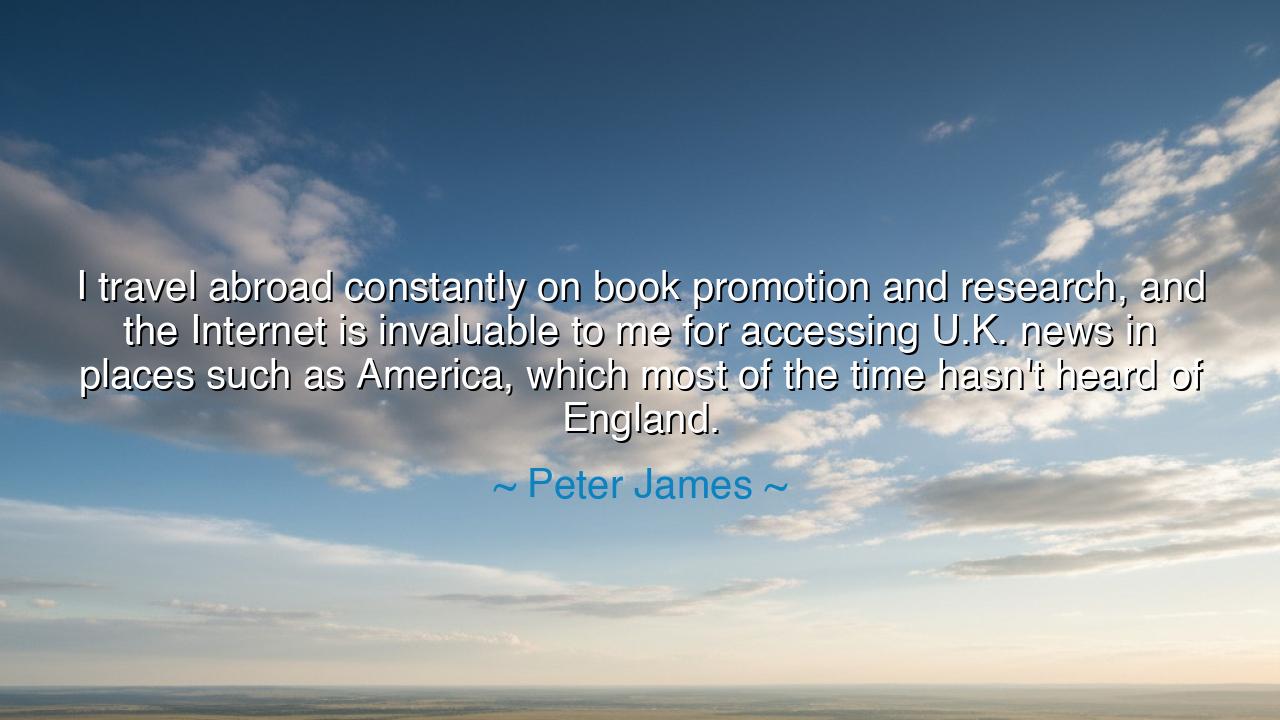
I travel abroad constantly on book promotion and research, and
I travel abroad constantly on book promotion and research, and the Internet is invaluable to me for accessing U.K. news in places such as America, which most of the time hasn't heard of England.






"I travel abroad constantly on book promotion and research, and the Internet is invaluable to me for accessing U.K. news in places such as America, which most of the time hasn't heard of England." Thus spoke Peter James, and within his words we glimpse the strange paradox of our age: though the world is bound together by wires and waves, though a writer may soar across oceans in mere hours, still nations remain like islands of the mind, often blind to one another. His words are not bitterness, but truth—the recognition that in a vast world, one must cling to tools like the Internet to remain tethered to the heartbeat of one’s own homeland.
The ancients, too, knew this longing. Did not Odysseus, though he wandered far into foreign lands, hunger for the voices of Ithaca, for news of his wife and son? Did not Marcus Aurelius, though emperor of a world-spanning empire, write in his meditations of the need to hold fast to his Roman soul amid the alien tongues and customs of distant provinces? The traveler is always torn—part of him delights in the new, but part of him yearns for the familiar. And so Peter James speaks: though in America, he reaches back through the threads of technology to hear the pulse of England, lest he become a stranger to his own soil.
The quote also reminds us of the limits of perception. He notes with irony that America, mighty and vast, often lives as though England scarcely exists. This is not malice, but the blindness of great nations, which sometimes look inward and forget the voices of smaller lands. History shows the same. The Persians, in their empire’s glory, saw Greece as a minor people; yet Greece would one day shape the whole of Western thought. The Romans once dismissed the tribes of Gaul as insignificant, until Caesar himself wrote their story into memory. So it is today: what seems forgotten by one land is still precious to another, and it falls upon the traveler to carry those stories across the seas.
Consider the role of writers in bridging these distances. Marco Polo brought tales of China to Europe, tales many at first doubted but which opened doors of imagination. Alexander von Humboldt’s travels through the Americas reshaped Europe’s understanding of geography, ecology, and culture. And in a quieter but no less important way, authors like Peter James carry the flavor of England to foreign shores—not only through their books but through their very presence, reminding the world of voices it might overlook.
Children of tomorrow, learn this: travel will broaden your mind, but it may also show you how easily lands forget one another. The remedy is not despair but connection. Use the tools of your age—the Internet, communication, letters, art—to remain rooted in your own heritage, even as you embrace what is new. And just as importantly, do not live blind to other nations. Seek to know their news, their struggles, their joys. For to ignore them is to live in a small world, even while standing upon a great one.
Practical wisdom lies here. If you journey abroad, carry your homeland with you, but also open your heart to the lands you enter. Learn their stories, share your own, and let the exchange of knowledge strengthen both. Do not allow distance to make you forget, nor let ignorance blind you to others. Be a bridge, as Peter James is—a traveler who unites rather than divides, who brings awareness where there was none, and who keeps alive the voices of many lands at once.
Thus the lesson is plain: in a world both vast and connected, it is easy to be forgotten and easy to forget. But those who travel and write, those who speak and share, become the guardians of memory and the heralds of unity. Peter James reminds us that travel, combined with the tools of connection, can keep the soul rooted even while the body roams. Let us then be such travelers—rooted yet open, loyal yet curious—so that no nation, no voice, and no people are ever left unheard.






AAdministratorAdministrator
Welcome, honored guests. Please leave a comment, we will respond soon